Selling firearms is a serious undertaking that requires the implementation of a comprehensive gun bill of sale for every transaction. Due to the inherent responsibility associated with firearms, it is imperative to have a firearm bill of sale template readily available to ensure all aspects of the sale are properly documented. This applies not only to professional gun dealers or traders but also to individuals engaging in firearm sales. By employing the appropriate documentation, you safeguard yourself against potential legal ramifications.
Crafting a firearm bill of sale serves the dual purpose of transferring ownership of the weapon and providing a means to establish your non-ownership in case the gun becomes involved in a criminal act. This pivotal responsibility acts as a shield, protecting you from legal repercussions and preventing entanglement in criminal cases that may arise in the future. Thus, if you intend to sell any firearms, it is essential to ensure that, at the very least, a handwritten bill of sale accompanies each gun during the transfer process. This measure serves as a vital safeguard for both the seller and the buyer, offering reassurance and accountability in firearm transactions.
Table of Contents
Gun Bill of Sale Templates
A Gun Bill of Sale is a legal document used to record the transfer of ownership of a firearm from a seller to a buyer. It serves as proof of the transaction and outlines the terms and conditions of the sale. The Gun Bill of Sale Template provides a structured format for creating this document.
It is important to note that the specific requirements and format of a Gun Bill of Sale may vary depending on the jurisdiction and the specific circumstances of the transaction. It is recommended to consult with local authorities or legal professionals to ensure compliance with applicable laws and regulations.
Gun Bill of Sale Templates can be customized using word processing software or online templates. They provide a standardized and legally recognized document to establish the transfer of ownership of a firearm. By using a Gun Bill of Sale Template, both the buyer and the seller can have a clear record of the transaction and protect their rights and interests.
What is a bill of sale for a gun?

A bill of sale for a gun is a legal document that records the sale and transfer of ownership of a firearm from one party to another. It serves as a written agreement between the seller and the buyer, outlining the specific details of the transaction. The bill of sale typically includes information such as the names and contact details of both the buyer and the seller, a description of the firearm (including make, model, and serial number), the purchase price, the date of the sale, and any warranties or conditions of the sale.
Do I Need a Gun Bill of Sale to Comply with the Law?
While a gun bill of sale is not mandatory in most states, it is essential to research and understand the specific regulations and laws in your state or county regarding firearm sales. Generating a bill of sale serves multiple purposes and provides valuable protections for both the buyer and the seller. Here are some key advantages offered by a gun bill of sale:
Proof of Legitimate Transaction: A well-documented bill of sale establishes evidence that the firearm was acquired through a lawful transaction, ruling out any suspicions of theft or illegal activities to obtain the weapon.
Confirmation of Legal Ownership: By creating a bill of sale, the seller can demonstrate that they willingly transferred ownership of the firearm and are no longer responsible for any actions or liabilities associated with its use.
Accurate Identification of the Firearm: The bill of sale includes crucial details such as the year, make, model, and serial number of the gun, ensuring precise identification and preventing any confusion or potential disputes in the future.
Seller’s Release of Responsibility: The document may explicitly state that the seller sold the gun “as-is,” implying that they do not bear any further obligations or liabilities related to the maintenance or performance of the firearm.
Gun bill of sale forms are commonly used in various settings, including trade shows and by firearms merchants, for good reason. These documented indicators can play a significant role if the gun becomes lost or involved in a criminal incident. By having a well-constructed bill of sale, both buyers and sellers can protect themselves and have a reliable record of the firearm transaction.
Preliminary Actions to Undertake Before Crafting a Firearm Bill of Sale
There are several preliminary steps you need to take before you embark on drafting your firearm bill of sale, whether it’s a private or commercial transaction.
Understand the Legal Framework. Before you proceed with the sale of a firearm, it’s crucial to familiarize yourself with the laws and regulations governing such transactions in your jurisdiction. This includes understanding the potential legal implications of selling a firearm to someone you might not know well. Even if the buyer is a friend, there could be restrictions that prevent you from selling the gun to them legally. The law will provide insights into whether you need to take your firearm to a dealer for sale.
Mandatory Background Checks. Ascertain whether you are legally required to conduct a background check on the potential buyer before the sale. In some areas, this is a mandatory procedure, and failing to comply could land you in legal hot water if the new owner uses the firearm for illegal activities. This requirement is one of the reasons why many people opt to sell their firearms through dealers or salespersons.
Contact the ATF. If you’re unsure about your legal rights or obligations in selling a firearm, it’s advisable to reach out to your local representative at the Bureau of Alcohol, Tobacco, Firearms and Explosives (ATF). Selling a firearm is a serious matter, and it’s always better to err on the side of caution.
Request for Firearm License or Permit. Always insist on seeing a valid firearm license or permit that allows the potential buyer to legally own a firearm in your state. Even if you’re dealing with a friend, it’s important to verify their legal capacity to own a firearm. If they cannot produce a license, refrain from proceeding with the sale until they can prove their legal eligibility.
How to write a bill of sale for a firearm ?
Writing a bill of sale for a firearm is a careful process that involves ensuring all legal requirements are met. Here’s a step-by-step guide:
Gather Necessary Information: The first step is to collect all the necessary details about the firearm and the buyer. This includes the firearm’s make, model, caliber, and serial number, as well as the buyer’s full name, address, and other contact information.
Start with a Title: The document should be clearly titled. Something like “Firearm Bill of Sale” is straightforward and appropriate.
Date and Parties Involved: Begin the document by stating the current date, followed by the full legal names and addresses of both the seller and buyer. Typically, this section will start with a phrase like “This document acknowledges that on this day, [date], [seller’s full name], residing at [seller’s address], is selling a firearm to [buyer’s full name], residing at [buyer’s address]…”
Describe the Firearm: Provide a detailed description of the firearm being sold. Include the make, model, caliber, serial number, and any distinguishing characteristics.
Include the Purchase Price: State the agreed-upon purchase price for the firearm, and specify the method of payment. If any deposits or down payments have been made prior to the creation of the bill of sale, those should also be mentioned.
Stipulate Legal Compliance: Include a statement that both parties are in compliance with federal, state, and local laws. Both parties should also acknowledge that the buyer is legally permitted to purchase and own a firearm.
Warranty Information: If there’s a warranty, include information about it. If there’s no warranty and the firearm is being sold “as is”, this should also be clearly stated.
Signatures: At the end of the document, both parties should sign and print their names. It’s also a good idea to have the document notarized for added legal security.
Make Copies: Provide a copy of the document to the buyer and keep a copy for your own records.
Concealed Weapons License
CWL on a firearm bill of sale usually stands for “Concealed Weapons License.” This acronym is used to denote that the buyer has a legal permit to carry a concealed weapon, depending on the laws and regulations of the specific jurisdiction. In some states, CWL might also stand for “Concealed Weapon License” or “Concealed Carry Weapons License,” but the meaning remains the same. This is an important factor in many firearm transactions as it indicates that the buyer has undergone necessary background checks and training required to carry a concealed weapon.
How to Sell a Gun Using a Firearm Bill of Sale
Selling a gun using a firearm bill of sale involves several key steps to ensure the transaction is conducted safely and legally. Here’s a comprehensive guide:
Understand the Law: Before you start the process, familiarize yourself with both federal and state laws regarding private firearm sales. Some states have strict regulations and may require transactions to be processed through a licensed firearm dealer.
Verify the Buyer’s Eligibility: Ensure that the buyer is legally allowed to own a firearm. This may involve checking if the buyer has a valid firearm license or Concealed Weapons License (CWL). In some states, you might be required to facilitate a background check for the buyer.
Prepare the Firearm Bill of Sale: Start drafting the firearm bill of sale. This document should include the full legal names and addresses of both the seller and buyer, the date of the sale, a detailed description of the firearm (including make, model, caliber, and serial number), and the purchase price. Include a statement that the buyer is legally permitted to own a firearm and that both parties are complying with all federal, state, and local laws. If applicable, information about warranty should also be included.
Meet the Buyer in a Safe Place: It’s recommended to meet the buyer in a public place during daylight hours to exchange the firearm and payment. If possible, bring a witness.
Complete the Transaction: The buyer should inspect the firearm. Once they’re satisfied, they should give you the agreed-upon payment. Both parties should then sign and date the bill of sale. It’s a good idea to get the document notarized for added legal protection.
Keep a Copy: Provide a copy of the signed and notarized bill of sale to the buyer, and keep one for your records. This document is your proof of the transaction and might be needed in the future.
Notify the Proper Authorities: Depending on your local laws, you may need to report the sale to local or state law enforcement or other authorities.
FAQs
Do I need a bill of sale if I’m giving a firearm as a gift?
The requirement for a bill of sale when gifting a firearm varies depending on the jurisdiction. In some places, a bill of sale may not be necessary for gifts between immediate family members. However, it is still advisable to create a bill of sale to document the transfer and avoid any future legal complications.
Can I use a firearm bill of sale for inherited firearms?
In the case of inherited firearms, a bill of sale may not be required, as the transfer of ownership is typically covered by other legal processes, such as probate. However, it is recommended to consult with legal professionals or local authorities to ensure compliance with the specific laws and regulations regarding inherited firearms in your jurisdiction.
Is a notary public’s signature required on a firearm bill of sale?
The requirement for a notary public’s signature on a firearm bill of sale depends on the laws of the jurisdiction. Some states or countries may require notarization to validate the document, while others do not. It is important to familiarize yourself with the laws in your area and consult with legal professionals if necessary.
Can I modify a pre-existing firearm bill of sale template?
Yes, you can modify a pre-existing firearm bill of sale template to suit your specific needs. However, it is crucial to ensure that all legally required information is included and that any modifications comply with the laws and regulations of your jurisdiction. It is recommended to consult with legal professionals for guidance when making modifications.
Can a firearm bill of sale be used for all types of firearms?
Yes, a firearm bill of sale can be used for all types of firearms, including handguns, rifles, shotguns, and other firearms. The bill of sale should include accurate and detailed information about the firearm being sold, such as the make, model, and serial number, to ensure proper identification.
Do I need a background check if I’m buying a firearm through a private sale?
The requirement for a background check when purchasing a firearm through a private sale varies depending on the jurisdiction. Some states or countries may require background checks for all firearm sales, including private sales, while others may have exemptions for private sales. It is crucial to understand and comply with the laws and regulations of your area regarding background checks.
Can I use a firearm bill of sale for antique firearms?
Yes, a firearm bill of sale can be used for antique firearms as well. When completing the bill of sale for an antique firearm, you should include relevant information about the firearm, such as its age, historical significance (if any), and any applicable licensing or permits required for the possession or transfer of antique firearms in your jurisdiction.
Can I sell a firearm without a license?
The requirement for a license when selling firearms depends on the laws and regulations of the jurisdiction. In many places, individuals can sell firearms without a license as long as they are not engaged in the business of selling firearms. However, it is crucial to familiarize yourself with the laws in your area to ensure compliance.
Can I use a firearm bill of sale for online transactions?
Yes, a firearm bill of sale can be used for online transactions. When conducting an online sale or purchase, it is essential to include all necessary information about the buyer, seller, and firearm in the bill of sale. Additionally, it is advisable to follow any specific guidelines or requirements set by online platforms or classified websites used for the transaction.
Can I create my own firearm bill of sale template?
Yes, you can create your own firearm bill of sale template. However, it is recommended to consult with a legal professional or use a pre-existing template specific to your jurisdiction to ensure that all necessary information and legal requirements are included.
Are there any restrictions on firearm sales?
Yes, there are typically restrictions on firearm sales, including background checks, waiting periods, and age requirements. These restrictions vary depending on the laws and regulations of the specific jurisdiction. It is crucial to comply with all applicable laws when buying or selling a firearm.
Can I sell a firearm without a background check?
The requirement for a background check when selling a firearm depends on the laws of your jurisdiction. In many places, private firearm sales between individuals do not require a background check, but sales through licensed firearms dealers generally do. It is important to familiarize yourself with the laws in your area to ensure compliance.
Can I sell a firearm to someone from another state or country?
Selling a firearm to someone from another state or country can be subject to additional legal requirements. It is essential to understand and comply with the laws and regulations of both your own jurisdiction and the jurisdiction of the buyer. In some cases, transfers may need to go through licensed dealers or involve additional paperwork.
How long should I keep a copy of the firearm bill of sale?
It is recommended to keep a copy of the firearm bill of sale for as long as you own the firearm. This will help establish a record of ownership transfer and can be useful for reference purposes or if any legal issues arise in the future.
Is a firearm bill of sale proof of firearm ownership?
A firearm bill of sale is not the only proof of firearm ownership. It is one piece of documentation that can help establish ownership transfer, but other documents such as registration, permits, or licenses may also be required depending on the jurisdiction. It is important to follow all applicable laws and regulations to establish legal ownership of a firearm.
















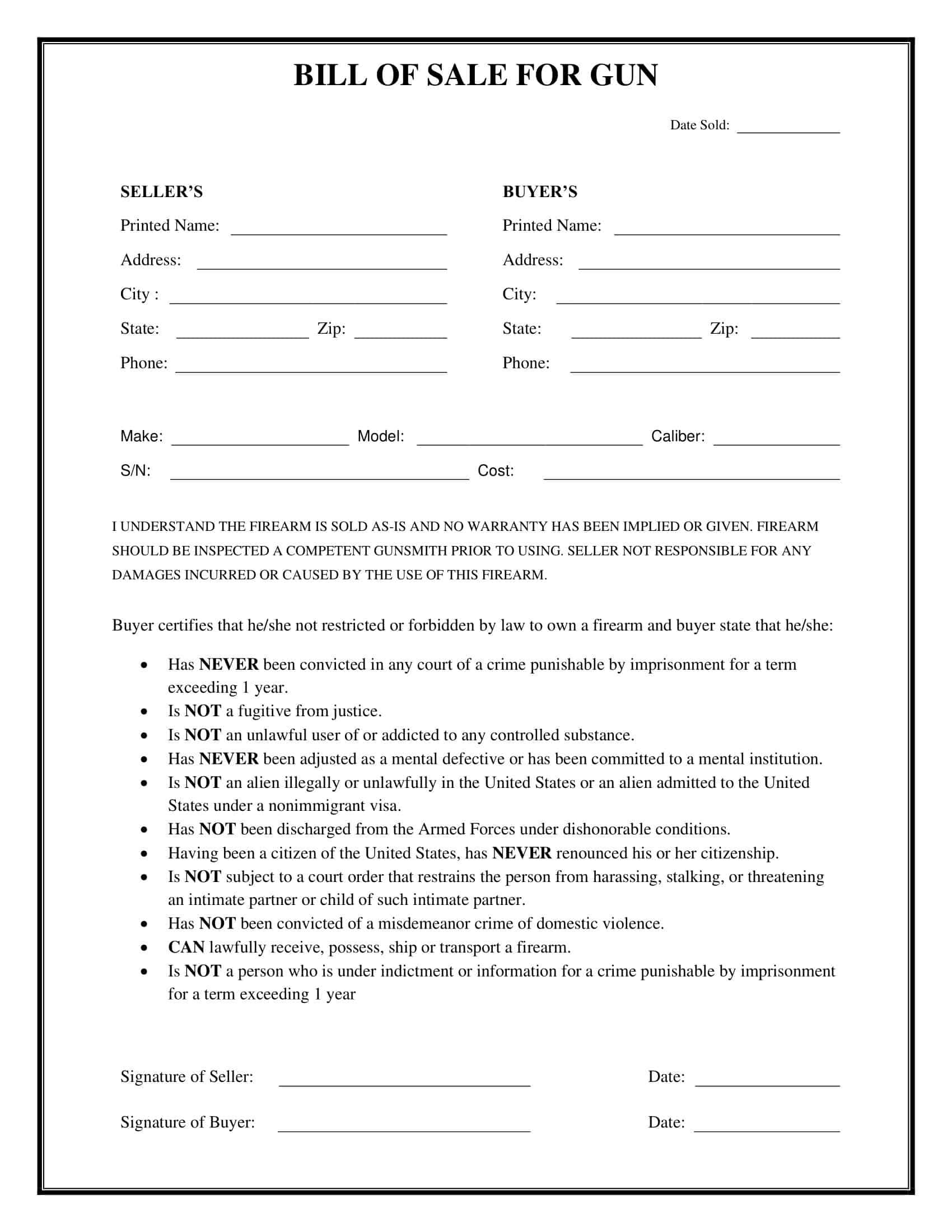



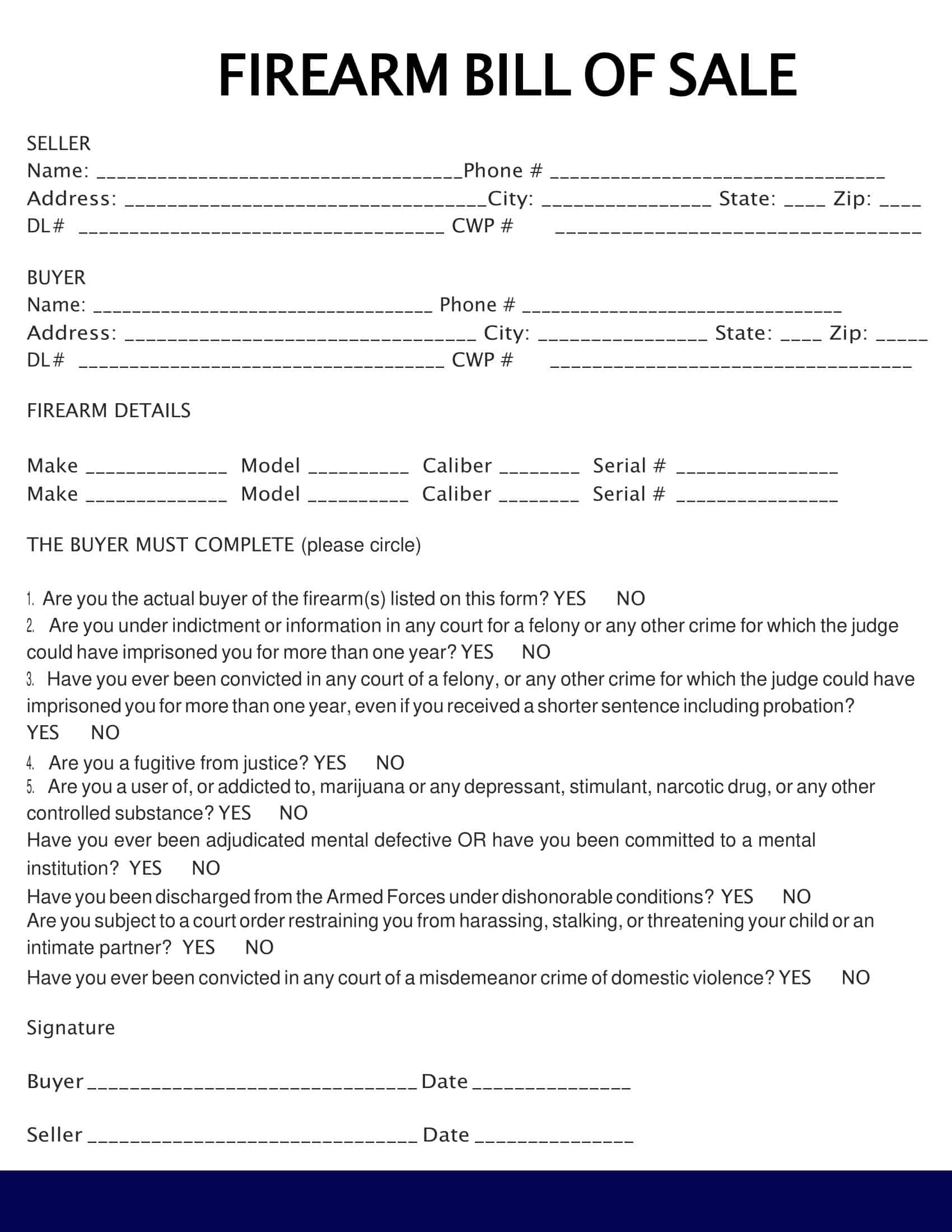


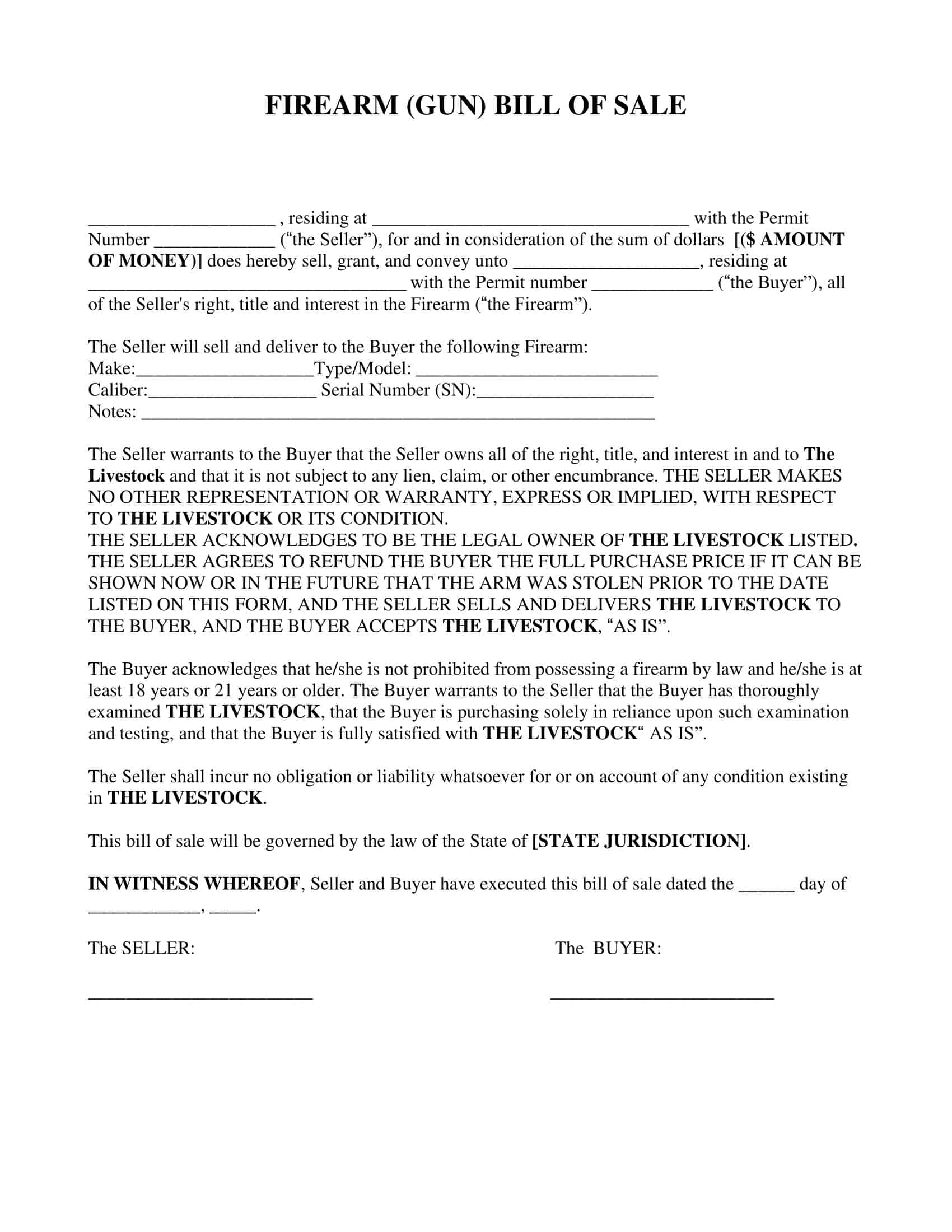










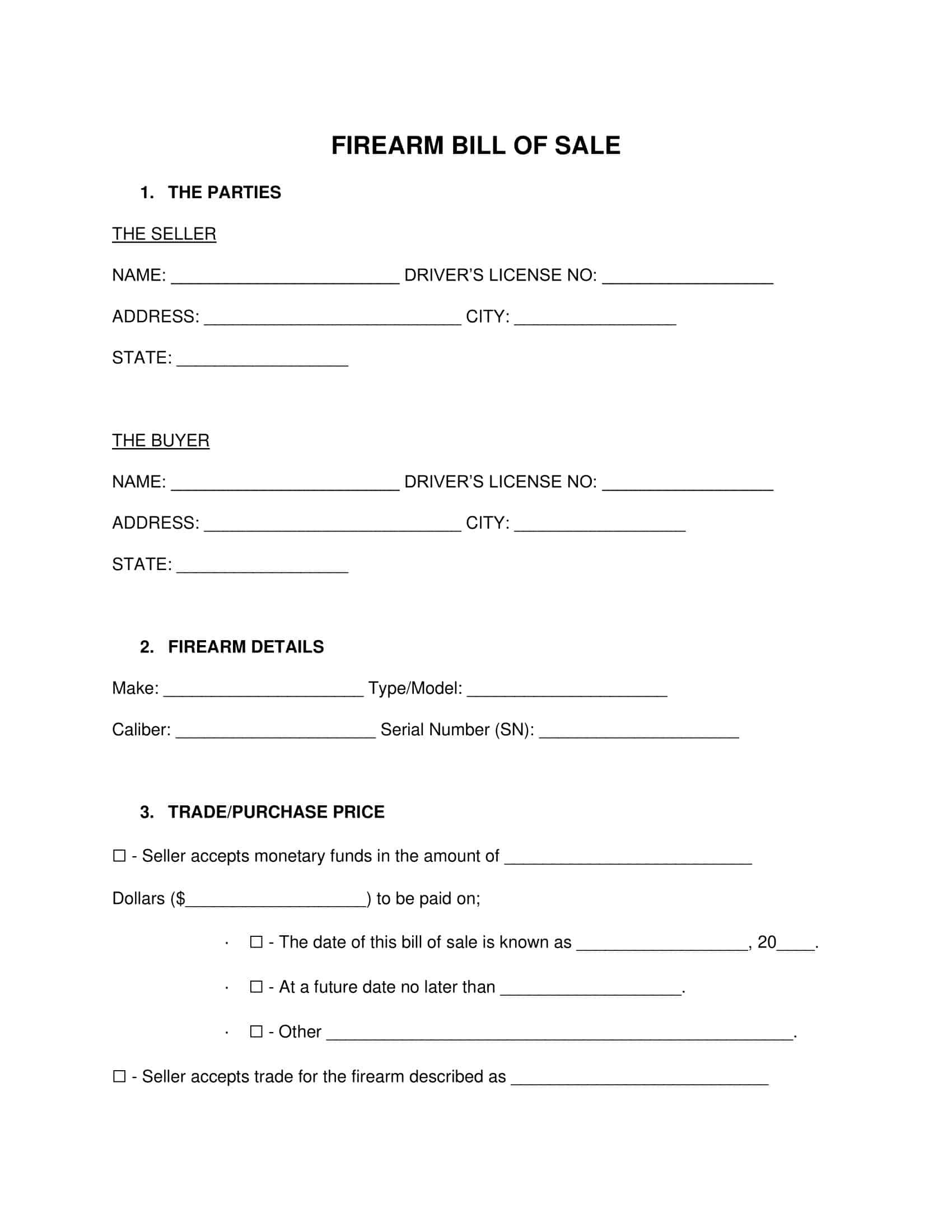
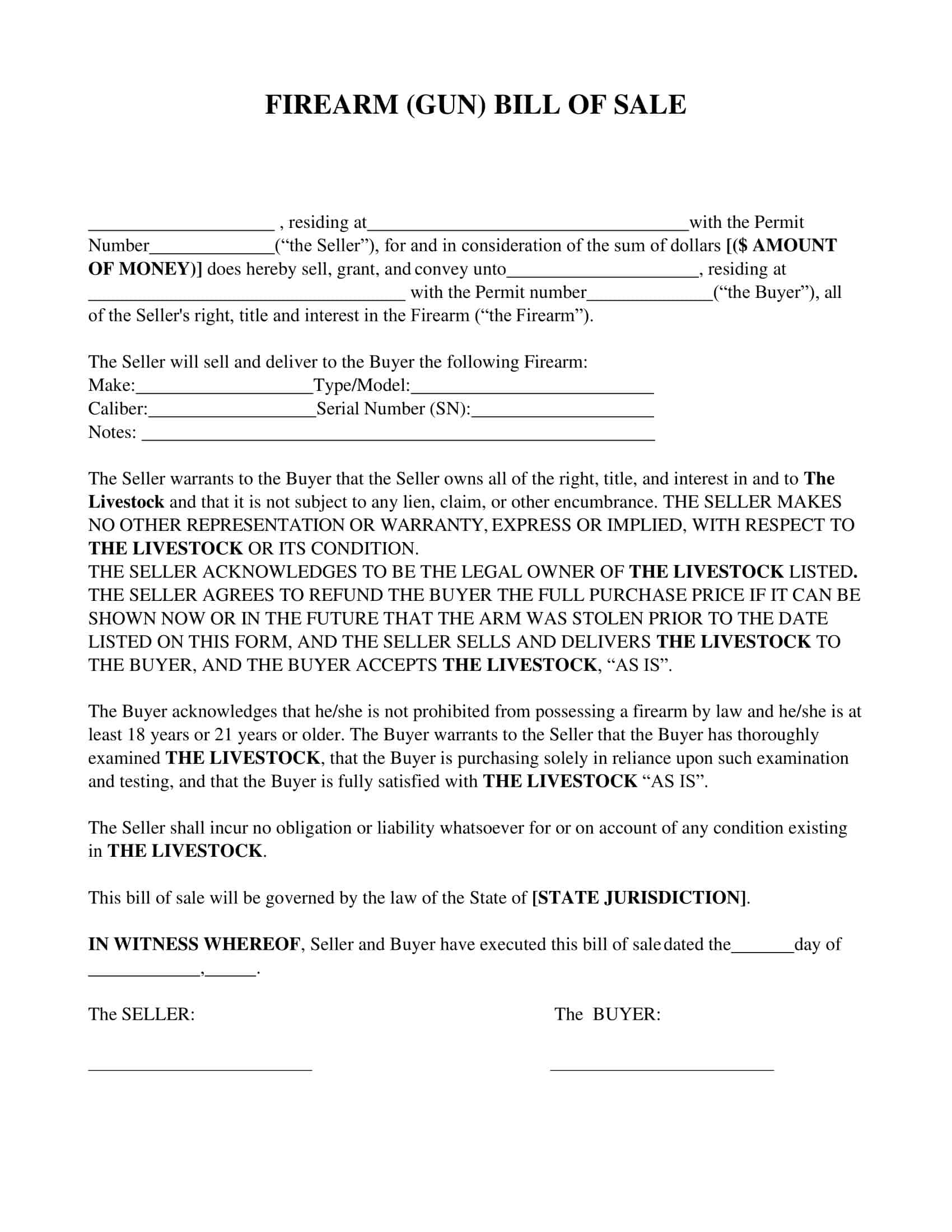



![Free Printable Bill of Sale Templates [Word, PDF] Simple 1 Bill of Sale](https://www.typecalendar.com/wp-content/uploads/2023/06/Bill-of-Sale-150x150.jpg)
![Free Printable Roommate Agreement Templates [Word, PDF] 2 Roommate Agreement](https://www.typecalendar.com/wp-content/uploads/2023/06/Roommate-Agreement-150x150.jpg)
![Free Printable Credit Card Authorization Form Templates [PDF, Word, Excel] 3 Credit Card Authorization Form](https://www.typecalendar.com/wp-content/uploads/2023/06/Credit-Card-Authorization-Form-150x150.jpg)
